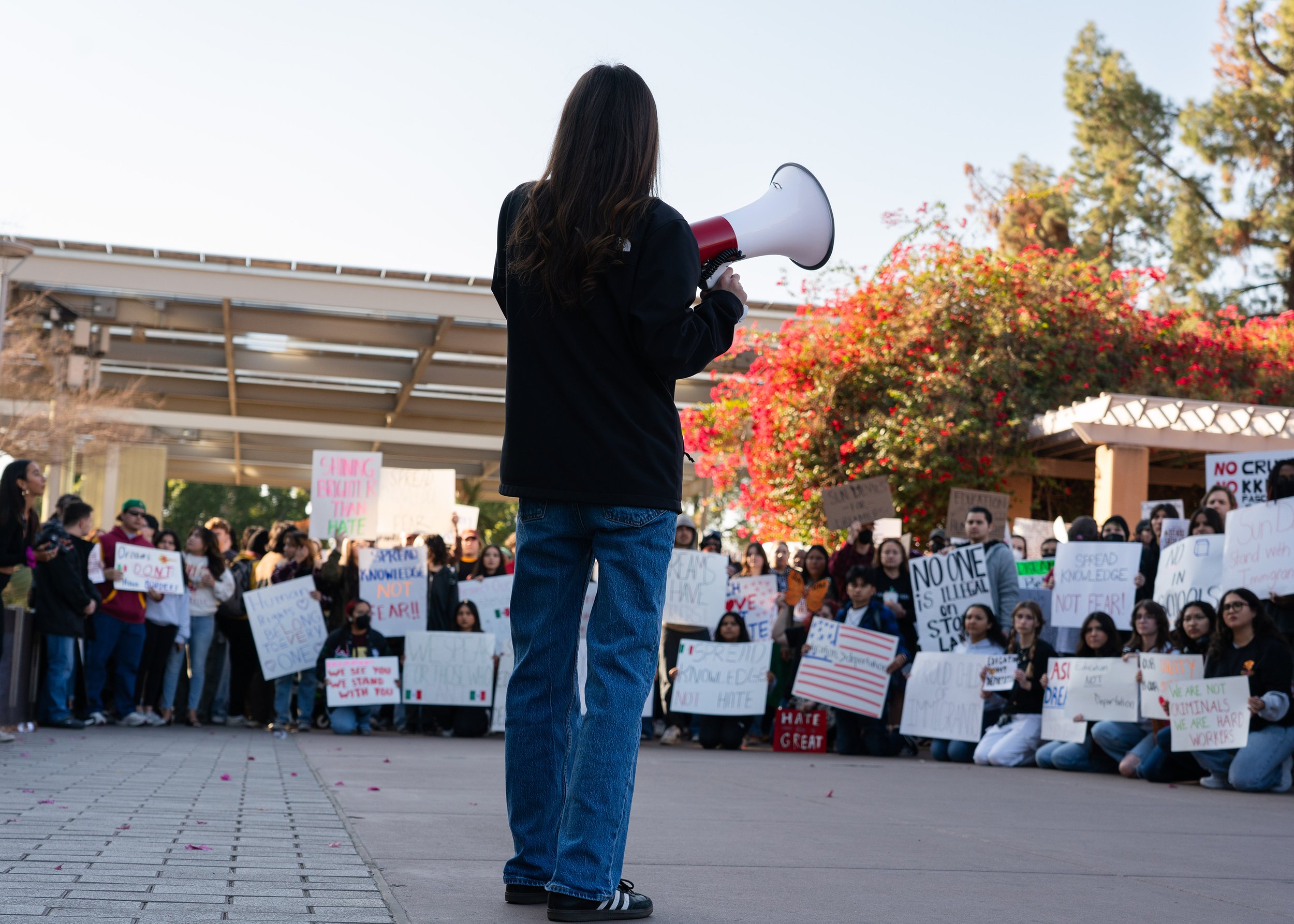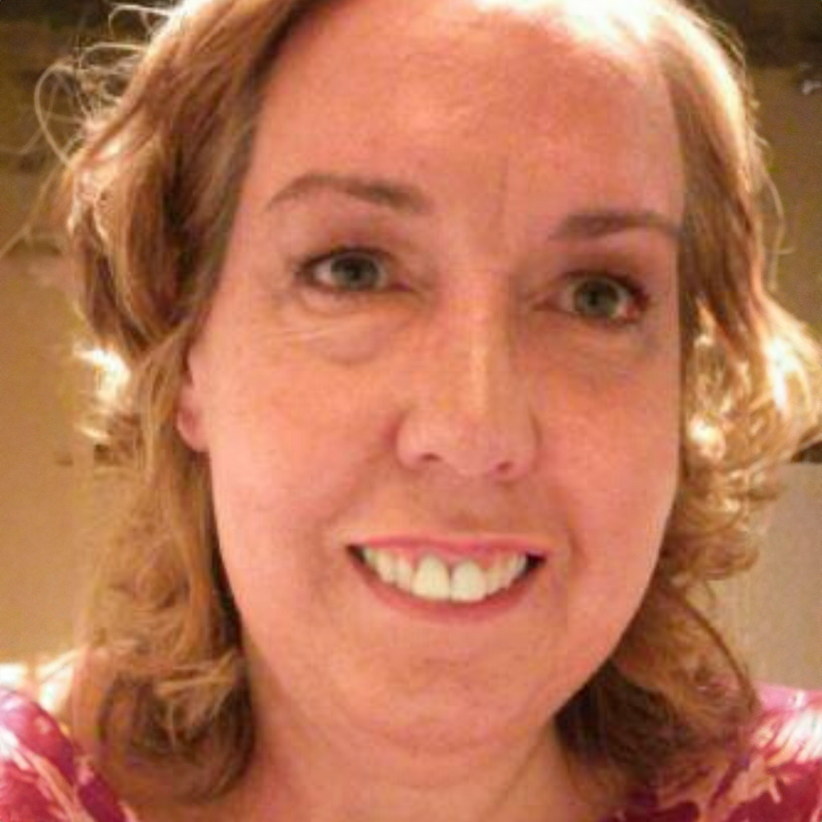Fear and Resistance: Latino Students Face New Pressures at Arizona Universities
Matilde during a student protest in January 2025 at Arizona State University (ASU). Photo courtesy of Aliento
From Marches to Silence: How Trump’s Policies Are Rewriting — Through Fear — the Lives of Latino Students in Arizona.
Haz clic aquí para leer este reportaje en español.
Matilde grabbed the megaphone and spoke firmly. Her voice cut through the greenery of Arizona State University (ASU), where hundreds of students marched behind her in tight formation, some carrying signs with phrases like, “We all belong.” It was a cold January morning, but the air was charged with warm enthusiasm.
With each step, the students — mostly immigrants and Latinos — chanted in unison, “We’ll keep dreaming,” “We’ll keep studying,” “Education is for everyone.” Matilde, leading the march, felt empowered, proud, and supported.
But Matilde’s enthusiasm faded soon after spring arrived in Arizona. Her once strong, projected voice grew quieter, more measured. On a sunny April day, sitting on ASU’s Tempe campus, her conversation turned cautious. She avoided words like “Trump” or “deportation.” Fear, silent but persistent, had settled in.
Matilde is a pseudonym. She chose it for protection. Though born in the U.S., her parents are Mexican and undocumented. Her fear isn’t for herself but for her family. She worries that the new policies pushed by President Trump’s administration could endanger those, like her parents, living in the shadows. For her, students have become a visible target.
Trump has intensified scrutiny of universities and their accrediting bodies as part of a campaign to curb what he calls a “progressive agenda.” His administration has particularly targeted diversity, equity, and inclusion (DEI) programs, questioning their legitimacy and threatening funding cuts if they don’t align with his ideological priorities.
‘Now, she’s afraid to protest because they’ve been told they’ll lose scholarships or get expelled. They’re being silenced.’
Matilde is active in the Barrett Council, a student group within ASU’s honors college that celebrates Hispanic identity through cultural events. But now, she fears these activities — which give many Latino students a sense of belonging — could disappear from the university calendar amid growing political pressure on DEI programs.
“It’s stressful to think we might lose these events. When I first came to ASU, they made me feel, ‘Oh my goodness, here are my people.’”
Over 500 U.S. institutions serve Hispanic students, and that number is expected to grow as more universities are designated Hispanic-Serving Institutions (HSIs). By 2026, enrollment is projected to exceed 4.3 million Latino students.
Arizona State University, the University of Arizona, and Northern Arizona University, among others, are federally recognized HSIs, meaning at least 25% of their student body is Hispanic.
Student protests at ASU, an HSI where Latinos make up at least 25% of enrollment. Courtesy of Aliento
According to the Presidents' Alliance on Higher Education and Immigration, over 9,500 undocumented and DACA-protected students attend Arizona’s public universities.
Latinos make up 45% of Arizona’s K-12 students but only 25.5% at its three public universities, while white students account for 51%. Helios, an education-focused organization, projects Latinos will surpass 50% enrollment by 2026 — a gap that raises questions about representation and access, now further threatened by anti-immigrant policies.
Silencing Their Voices
The day Matilde spoke up at the ASU rally, Yadira — an immigrant mother from South Phoenix who asked to remain anonymous — was paralyzed by fear. Her daughter, another ASU student in Tempe, had joined the protest organized by Aliento, an advocacy group for undocumented and mixed-status families.
Yadira’s daughter was one of more than a thousand students and supporters who marched around a table where members of College Republicans United had announced an event on social media that was happening on January 31.
“We’ll be on campus asking classmates to report their criminal classmates to ICE for deportation,” they posted on the social media site X, linking to ICE’s official tip form.
Yadira’s 20-year-old daughter overcame her fears and joined the protest. But weeks later, anxiety began outweighing her desire for justice. On her worst days, she begs her mother to consider moving back to Mexico. “We should build a house there, just in case,” she says through tears. “So we have somewhere to go.”
Matilde, the daughter of Mexican immigrants, overcame her fears and stood up against the anti-immigrant rhetoric at her university. Photo by Beatriz Limón
Yadira came from Michoacán, Mexico, at 17 and raised five children in Arizona. Though U.S.-born, they grew up fearing deportation — a fear cemented in 2013 when their father was deported, never to be seen again. That memory still haunts them.
“Now, she’s afraid to protest because they’ve been told they’ll lose scholarships or get expelled. They’re being silenced,” says Yadira.
Yadira says her citizen children live in constant fear of being detained just for looking Latino. “They’re scared to leave home without ID. They suffer anxiety, depression. Even citizens get detained.”
‘The focus on anxiety is the lack of information and thinking of what could happen.’
Dr. Alfredo Padilla, a psychology researcher at Mexico’s Universidad Autónoma de Baja California and a member of the American Psychological Association, explains that much of immigrants’ anxiety stems from ambiguity. Trump’s policies, he says, lack clarity.
“The focus on anxiety is the lack of information and thinking of what could happen.” The most damaging, he cautions, happens when that incertainty suggests menacing scenarios. “If what could happen is bad, one risks physical and psychological harm.”
Even before the pandemic, mental health struggles were rising. During the 2020-21 academic year, 73% of college students reported heightened stress and anxiety because of COVID, according to the National Center for Education Statistics. Padilla warns that one of the most alarming concerns is to stop the rise in suicidal ideation among youth ages 8 to 19. “And with everything already going on, you add uncertainty,” says Padilla, “It becomes even more alarming.”
With papers in hand on college campuses
An email spread quickly through classrooms: The University of Arizona now advises international students to carry physical and digital copies of immigration documents (passport, I-94, proof of status) at all times, citing Trump’s stricter policies.
‘I’m going to keep doing what I’m doing until somebody literally takes me out kicking and screaming, because I won’t make it easy for them … I'm not quitting, they'll have to kick me out.’
Many diversity programs have already vanished. UA’s Immigrant Student Resource Center website was abruptly shut down. The phrase “committed to diversity and inclusion” was scrubbed from a land acknowledgment honoring Indigenous people, angering Indigenous students. At ASU, LGBTQ+ resources were quietly redirected to a Rainbow Coalition page.
Over 150 U.S. college presidents signed a statement condemning Trump’s “unprecedented government overreach” into universities. Arizona’s three public universities have not signed on.
ASU's charter emphasizes inclusion: "…measured not by whom it excludes, but by whom it includes and how they succeed." The text is displayed near Durham Hall in Tempe. Photo by Sydney Lovan/Cronkite News
Sandra (a pseudonym), an ASU professor who also runs a diversity program, calls the situation “horrible.”
“We must be careful. We don’t want the university to become a battleground,” she tells palabra.
The reality Sandra sees for students is very complicated, and from her perspective, it varies depending on their immigration status: undocumented immigrants face different challenges than those with DACA, or Deferred Action for Childhood Arrivals. Citizens, although legally protected, also bear the anxiety of having undocumented family members. For international students, uncertainty is another constant.
“There are kids who are citizens, but their father was deported, and the father was the breadwinner for the family,” Sandra said. “So what does that family do now? It's a very stressful situation for the students.”
Universities across the country, after years of building initiatives focused on diversity, equity, and inclusion, are now being forced to dismantle those efforts in the face of an increasingly hostile political climate.
Sandra doesn't know if her program will continue at ASU, but she's clear about her position. “I’m going to keep doing what I’m doing until somebody literally takes me out kicking and screaming, because I won’t make it easy for them.” While others step back, she says, “I'm not quitting, they'll have to kick me out.”
‘They are afraid to do the usual things that were normal under the previous administration: going to school, work, church, the hospital. It's taking a significant toll on their mental health, with anxiety, stress, and a lack of decision-making power.’
On April 28, Trump signed an executive order affecting non-citizen college students who receive in-state tuition and threatens to reverse one of the most significant advances for students without legal status in several states. The measure targets Proposition 308 approved by Arizona voters in 2022, which allows these students to pay in-state tuition at universities and community colleges. If implemented, young people without immigration status would have to pay up to three times more for their education.
At least 25 states, along with Washington, D.C., have passed “tuition equity” laws or policies that allow undocumented students and “Dreamers”— DACA recipients — to pay in-state tuition fees if they attended and graduated from local high schools. Arizona is among them, along with states like California, Florida, New York, and Texas.
Monica Andrade, attorney and director of the Presidents' Alliance on Higher Education and Immigration, warned that attempts to punish states that expand access to higher education are misguided and counterproductive.
“States have long had the authority to establish in-state tuition policies that recognize immigrant students' deep ties to their communities,” she said in a statement. “Penalizing them for doing so undermines individual aspirations and weakens the economic future of our states and the country."
An ASU student march in support of immigrants. Photo courtesy of Aliento
“Changing Hearts and Minds”
For José Patiño, vice president of education and external affairs for Aliento and one of the main proponents of Proposition 308, what was once just lip service from Trump is now a real threat. Before, he said, Trump was still surrounded by people who believed in institutions and the rule of law.
“Now he’s doing everything he couldn’t do in his first term. Many people still don’t realize it.”
Young people approach Aliento with fear. Anxiety about what might happen to them or their families makes them question situations like filing their taxes, seeking financial aid for college using the federal FAFSA form, filling out scholarship applications, or simply going to college.
“They are afraid to do the usual things that were normal under the previous administration: going to school, work, church, the hospital. It's taking a significant toll on their mental health, with anxiety, stress, and a lack of decision-making power,” Patiño said.
‘The success we've had is in changing hearts and minds.’
Patiño is also fearful, not for himself, but for his family. As an activist, he knows that risks are part of the job; he was arrested in 2013 during an act of civil disobedience.
“We were coming from a different time, we felt empowered, we had won DACA, people had emerged from the darkness, immigrants' stories were being more accepted, there was more compassion and empathy.”
He says that nowadays, fear is no longer in the streets. It's at home. He worries that new policies directly target families like his. “What I find very cruel and unfair is that now they want to go against families.” Still, his hope persists. “I am stubborn and I don't give up easily,” he said. “The success we've had is in changing hearts and minds.”
Aliento vice president of education and external affairs José Patiño has been an activist in Arizona for more than ten years. Photo by Daniel Robles for palabra
Building Community
Dr. Padilla says that in times of crisis, what helps most is something as simple as getting together. A recent virtual forum of the European Federation of Psychologists focused on how professionals can support communities under pressure. The answer was clear: building community.
“Getting together and discussing what everyone is going through, understanding that you are not the only one, gives you the opportunity to help others and forget about your anxiety. This unity that can be established is a way to maintain emotional stability.”
He also suggested looking beyond borders. International forums, he noted, can offer support without interference from federal governments. “Fortunately, you can participate in international networks without being subject to local regulations.”
A history of tenacity and fight
For activist Raquel Terán, the political climate in Arizona is nothing new. Although extremism has increased, she recalls the raids carried out by then-Sheriff Joe Arpaio and the fear that the SB 1070 law created in immigrant communities in 2010 before several of its provisions were overturned by the U.S. Supreme Court.
As a student, Terán was part of the resistance against these policies. In her early 20s, she spent nights camping out in front of the state capitol, demanding justice and rights for her community. “We have freedom of expression, and that is the first constitutional right that must be respected.”
For her, trying to silence students through fear is a mistake, especially in times like these. She firmly believes that community organizing remains the most powerful tool against inequality.
“We have to use the courts, fight at all levels. We are going to organize a political force, because the Constitution still exists,” she said.
Raquel Terán outside the Arizona State Capitol at a demonstration against SB1164, which allows state and local law enforcement to work with federal immigration authorities. Photo courtesy of Progress Now via Raquel Terán
Terán traced her path from activism to power: from a young protester in front of the Capitol to a state legislator, chair of the Democratic Party in Arizona, and a candidate for federal congress. For more than 16 years, she has staunchly defended civil, labor, immigration, and reproductive rights.
“Students must not forget the power they have to put pressure on institutions, and to ensure that the administration does not allow school leaders to be intimidated,” said Terán, who now leads Proyecto Progreso, a coalition fighting anti-immigrant policies.
Support the voices of independent journalists.
|
Matilde caresses the Jesus pendant that hangs around her neck. Faith sustains her. She believes the students and the migrant community will prevail. She knows pain — a family member was deported — and also resistance: she grew up in north Phoenix, in a predominantly white school where she said they tried to take away her culture and language. “You don't conquer hatred and fear with more fear, but with love, faith, and good intentions. That's what will help us in this world,” she commented.
She wears a Brazil jersey, a tribute to her passion for soccer. She was a forward on her high school team until an injury forced her to take a break. She played through the pain until a crash ruptured the tendon in her knee.
She knows she'll return, when she's ready, when nothing stops her.
“I'm a person who doesn't know how to stop,” she said with a mischievous smile.
Matilde is sure that students and the immigrant community will succeed. Photo by Beatriz Limón
—
Beatriz Limón is a freelance journalist with extensive experience in the field of communications. She has been a correspondent in Arizona and New Mexico for the international news agency EFE, as well as for The Arizona Republic, where she contributed to the Latino publication La Voz. She has been a reporter and editor at several newspapers in Mexico. She earned a B.A. in communication sciences from the Universidad Autónoma de Baja California and a master’s in history. She has received fellowships from the Solutions Journalism Network and has contributed articles for the SJN Labor Cohort. She is currently an Education Writers Association fellow working on a series of articles on the topic: “The worrisome mental health situation among Latino students in Arizona.” Additionally, she is an accomplished professional photographer and a columnist for the newspaper El Imparcial. She also contributes to Arizona Luminaria, palabra, Factchequeado, and Conecta Arizona. @BetyLimon16
Patricia Guadalupe, raised in Puerto Rico, is a bilingual multimedia journalist based in Washington, D.C., and is the interim managing editor of palabra. She has been covering the capital for both English- and Spanish-language media outlets since the mid-1990s and previously worked as a reporter in New York City. She’s been an editor at Hispanic Link News Service, a reporter at WTOP Radio (CBS Washington affiliate), a contributing reporter for CBS Radio network, and has written for NBC News.com and Latino Magazine, among others. She is a graduate of Michigan State University and has a Master’s degree from the Graduate School of Political Management at George Washington University. She is the former president of the Washington, D.C., chapter of NAHJ and is an adjunct professor at American University in the nation’s capital and the Washington semester program of Florida International University. @PatriciagDC












